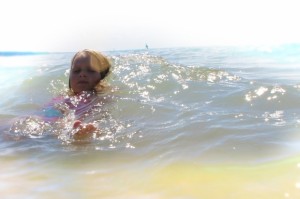Hosted Post!
Every child should learn how to swim. Even if you don’t have a pool or live anywhere near a beach it is still important for them to learn. They don’t want to be the one kid at camp that has to sit on the beach while everyone plays in the water. Not to mention, they may avoid pool parties with friends as a teenager and never experience the joy of going kayaking during a camping trip as an adult. Plus, a child that grows up to be a non-swimming adult is less likely to teach their own children how to swim. Provide your child with this valuable skill, even if you aren’t a swimmer yourself.
Start with Your Newborn
You are probably saying, “How can I teach a newborn to swim?” Well you really can’t, but you can make sure they view water as a positive element. Obviously, bath time should always be upbeat and fun. I also recommend mounting a wall fountain in the nursery. They will constantly be soothed by the sound of cascading water. Plus, fountains improve air quality. You can pick one up at online stores like SoothingWalls.com.
Teach Skills as a Toddler
Learning how to blow bubbles is fun for them, and it gets them used to having their face touch the water. It is a good idea to have them comfortable being lightly splashed in the bathtub before they take a lesson, get splashed in the face, and get upset.
Start Lessons
Many people begin swimming lessons when their child is a toddler. If they are already a little older, it is never too late to start. If you have access to a pool and feel confident, you can teach your child yourself. Otherwise, check with your local YMCA, gym, community pool, etc., to find out when lessons are available.
Safety Tips
- Never submerge a child under 3 years old. Kids under this age are more likely to swallow enough water to cause water intoxication.
- Don’t rely on water wings, inflatable toys, or air-filled swimsuits. A child reliant solely on these devices can drown should they deflate. If a floatation device is needed, a lifejacket approved by the U.S. Coast Guard is recommended.
- Never leave toys in a personal pool. A child may be tempted to retrieve them when you turn your back for a moment.
- Don’t force a child to do something they are not comfortable with. Be encouraging until they are ready.
- Never assume a lifeguard is watching at a public pool. They have many children to keep an eye on.

